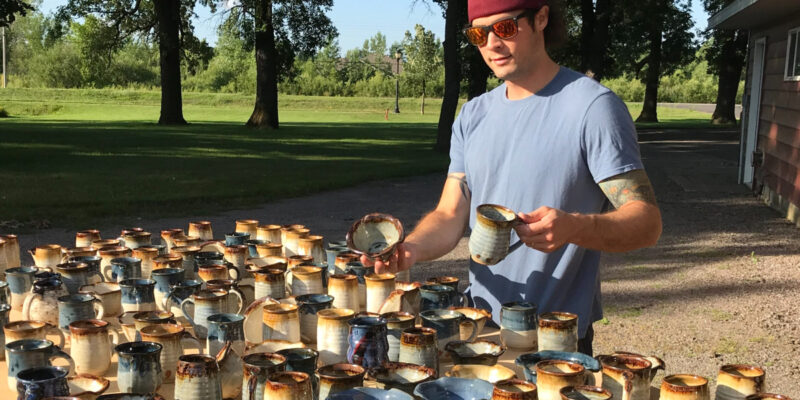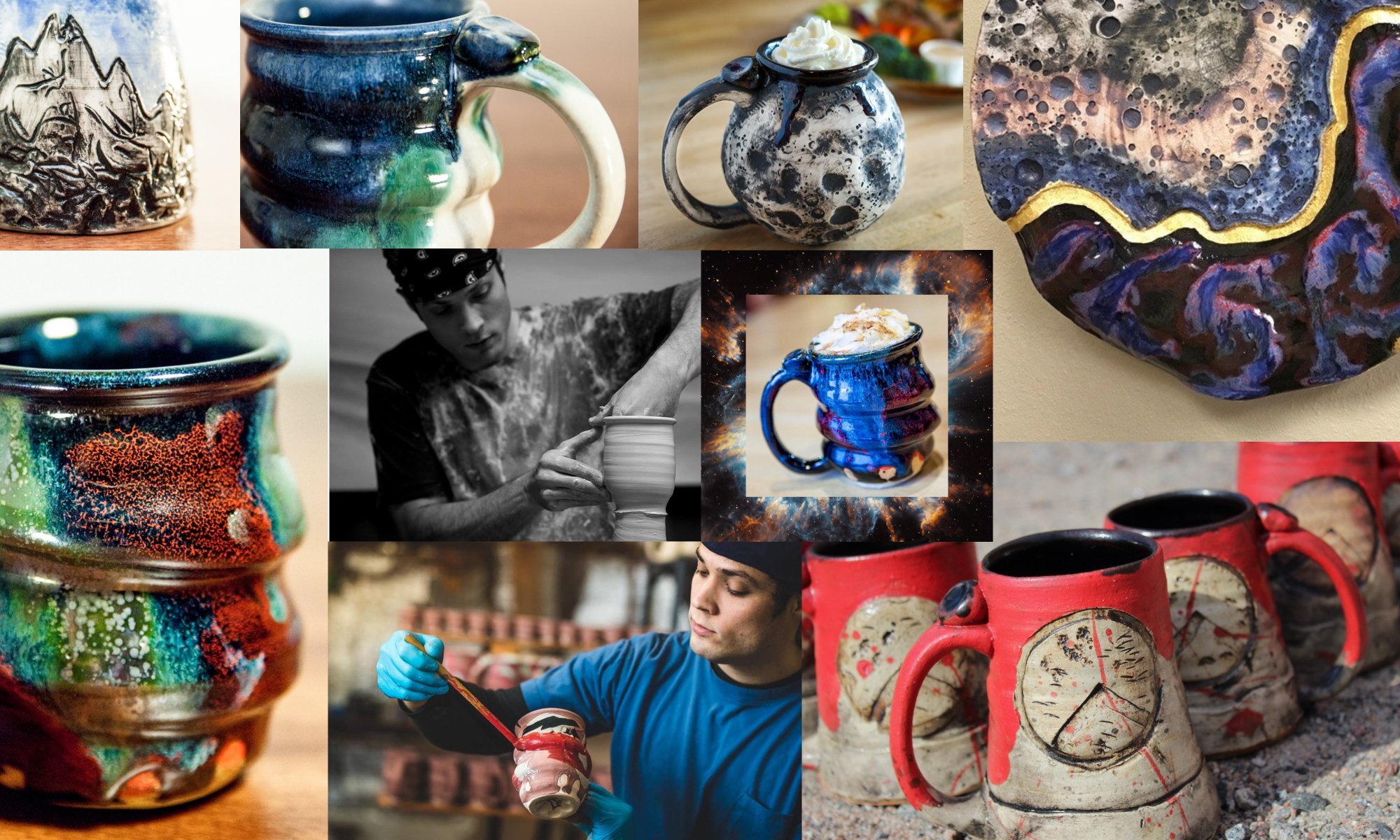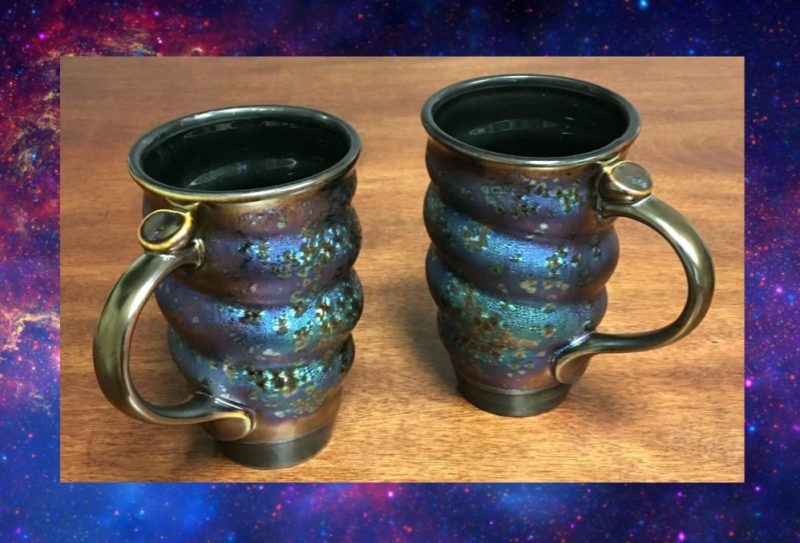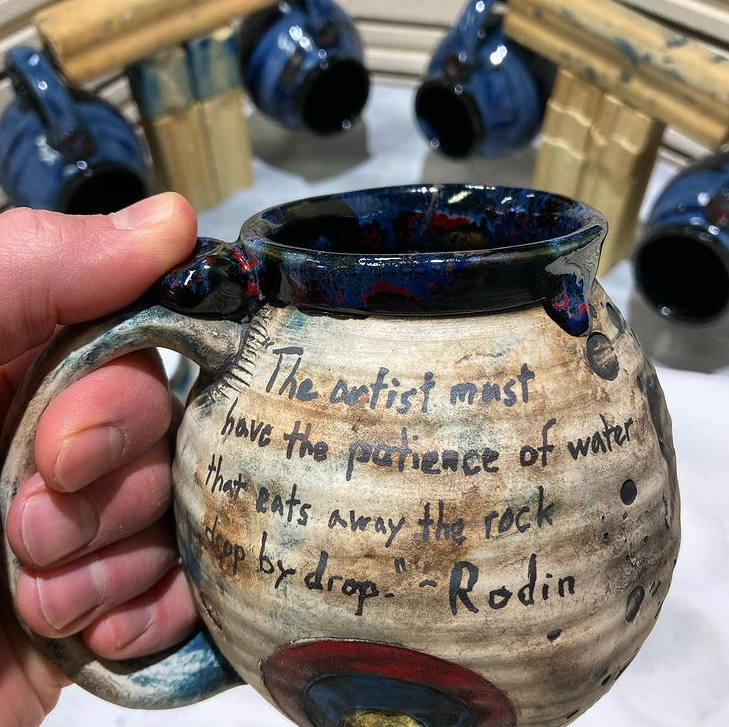(estimated reading time: 4-6 minutes)
For about 15 years, I’ve been making pottery full-time. First as a student, then by starting Cherrico Pottery. After handcrafting about 30,000 pieces of pottery, I can tell you from first hand experience that making pottery is really hard.
I’m a “production potter” which means I make pottery in repetition, in a variety of styles and colors, for people to eat and drink from. Each month, I handcraft about 500 pieces of pottery. Then, a team of employees sand, polish, pack and ship each pot to customers, for people to use and enjoy in their own homes.

It’s a good living, but that’s a lot of pottery to make by hand.
Repetitive work is tough. If you’re not careful, you can get overuse injuries:
-
- back strain from lifting heavy clay boxes
- neck and shoulder knots from hunched over work
- carpel tunnel wrist pain from throwing or sanding pots
For long-term sustainability, of both employees and me, I need to continually explore ways to reduce the strain on our bodies.
Two years ago, I began a research project. I tested having a version of my “Cosmic Mug” designed and made in a factory, by other workers. I created “Cosmic Mugs” to inspire us to think about how all human beings are connected, through the cosmos. So, why not use factories globally to create thousands, perhaps millions of mugs?
The goal was to get the price down to $19.95 for a pair, with free shipping, so anyone could afford Cherrico Pottery.
At first, China seemed like the perfect place to mass produce porcelain, a.k.a. “Fine China” because the Chinese have spent 2,000 years mastering the craft. With 1.4 billion people and hundreds of porcelain factories, they can make thousands of artistic mugs fast, cheap and with remarkably high quality.
After choosing a factory, I designed and bought roughly 1,000 mugs at about $10-$15 each. Most sold for about $26-$36 each.
That’s a pretty good start, considering over 800 sold and only 200 remain.
Next, I got a quote for a larger order of 10,000 mugs. They could be finished in 30 days, at around $4 per mug.
Sounds great, right!? That’s a 60%+ lower cost up front for me. That also means lower prices for customers– win win?!
Not exactly. I decided not to buy 10,000 mugs. Instead, I’m ending the project.
Why I’m Ending Our “Factory Designed Cosmic Mug” Project
After the remaining 200 Factory Designed Cosmic Mugs sell out, they’ll be gone for good. Seriously. No April fools.
Years of diving deep into the business of factory sourcing has given me one key takeaway: factory work is really hard on people.
I want my art to be good for all humanity, not just profitable.
For a quick glimpse of what it’s like to work in factories, these two documentaries are enlightening. Both helped influence my decision to start, and also end, my project.
American Factory
Manufactured Landscapes
Here at Cherrico Pottery, we considered building a factory ourselves, to have more control over how people are treated as employees. We already have a large studio. Maybe we should keep expanding.

Where would you rather work: a factory or a studio?
Factories make things faster, cheaper and more profitable. The problem is people are treated like machines.
Studios make things with creativity and connection. The problem is the products can’t scale in quantity, requiring higher costs.
The world needs both. But where would you rather work?
I’d rather work in a studio, but I’m also lucky enough to be able to say that, and choose that. Most people don’t get to make that choice.
For millions of people, perhaps billions, factory jobs are the only jobs available. Some factories might be wonderful places to work. Others might have terrible working conditions.
Regardless, if people didn’t need to work 8-12 hour shifts on the factory floor, do you think they still would?
Robots and Universal Basic Income
The world needs manufacturing. Most of the objects we’re surrounded by were made in factories, including whatever smartphone, computer or device you’re reading this on.
What will happen as robots continue replacing people in repetitive factory work? Robotic hands might even be dexterous enough to craft pottery soon.
View this post on Instagram
Maybe robot help won’t be such a bad thing. Ideas like Universal Basic Income or “monthly citizen income” could let more people meet their basic costs of living. Then, perhaps more people could work on jobs that fulfill them personally. If machines can help reduce hard labor, why not let them?
After robots help reduce the hard, human cost of manufacturing, then maybe we’ll revisit using factories to make “Cosmic Mugs” affordable enough for anyone on the planet to experience them.
Until then, I’m headed back to the studio. No more time spent sourcing from factories. Instead, I’m putting that energy into exploring new art. The challenge now is making the best art I can, in appropriate quantities and fair prices, and trusting that people will still support it.



Joel, it is your heart and hands that make art. I appreciate your heart’s decision to keep it small and respect all humans. Best of luck.
Yes, I am proud of you and your decision. Keep making the world a better place and thank you for the heart warming documentary. I work in an assembly line for lab corp and know 1st hand on what factory work is like. I will always support you.
This hit my heart as someone who’s gut and soul knows true right from wrong, good from bad, easy from hard…and is doing the right thing. Applause to you and Sienna and your integrity.
Hi. Can I purchase some of those last 200?
Thank you. Yes, the remaining mugs are available on cosmicmugs.com
It means more to have pottery made by hand. You can see more details in the work from a human than a machine. Plus I rather support a person working hard for their money than a factory.
Keep up the awesome work Joel & Sienna.
Would love to see Sienna make paper live on video someday too.
I appreciate the thought and reasoning you put into all your business decisions. May it be a blessing for you.
Mugs with inspirational quotes like the one in the above photo are even more fabulous and creative. Love it ! 🥰
I appreciate your heartfelt decision. Sometimes it’s hard for us to see what some laborers have to endure for the product to be more affordable. I am proud to own 18 of your beautiful pots. I am also proud to be a Patreon and support your art. Best wishes to you and Sienna.
Good idea I love my mugs because YOU are the artist that made them. They are made with your ability to produce them by hand Your hand your art it means something especially to others that appreciate art. Don’t sell out to foreign companies. Keep doing your wonderful art.
So pleased to read this decision! The factory mass production plan made me lose interest . Every morning I’ve enjoyed drinking my coffee out of my favorite mug , thinking ..thank God I own this one ! Worked by the artist’s hands ! I’d be interested in another one , with inspirational quotes , as well .
Joel, this touched me deeply. My respect for you has only grown deeper.
Joel, it was the ability to watch and listen to live sessions which helped me. I’ve several of your mugs and each one is special to me. I have been fortunate to be able to gift a few to my friends. They all love them just as much. Stay true to your heart and craft. Believe that and the cosmos will provide. Thanks
I’m much appreciated, from an artist to other, that you have given up a thought to continue factory-made mugs. These mugs doesn’t define you at all. I rather to have a handmade mug from you, the one I can drink or use it as an art decoration. It shows your raw hands being labored with love and precision. One day when you are gone, we have a mug to remember: “Legendary of Cherrico the Pottery Artist”
Tracey
I think it’s a combination of two types of people. My husband worked 12 hrs sometimes 7 days a week driving heavy machinery for 44 years in a factory but he loved it and it was what he could do. But artists have a different calling and if they want to make it big it takes the same amount of work. Only difference is you have some amazing work to cherish. My husband is retired and has nothing to show you are just getting started it should be a time of joy it goes quick.